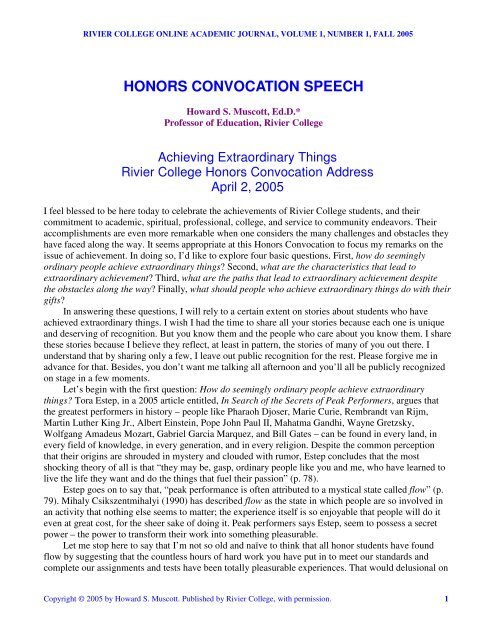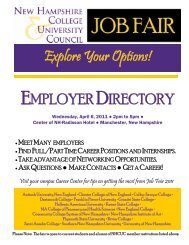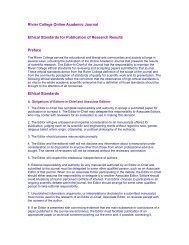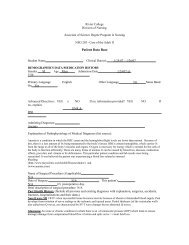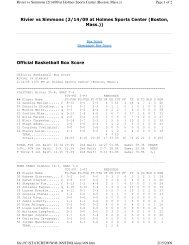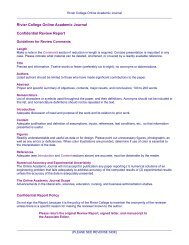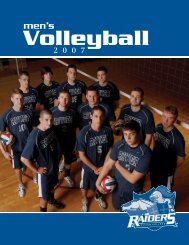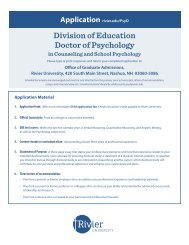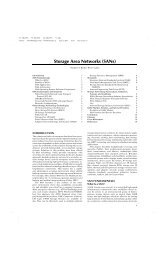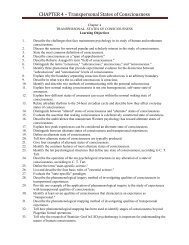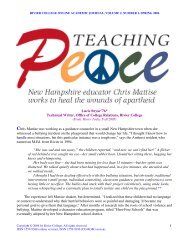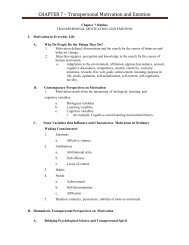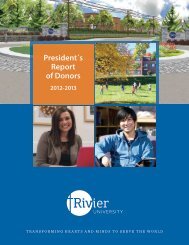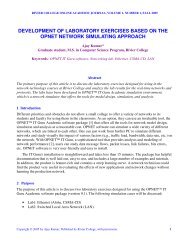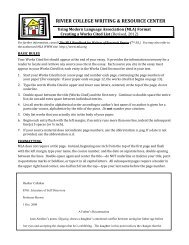HONORS CONVOCATION SPEECH - Rivier University
HONORS CONVOCATION SPEECH - Rivier University
HONORS CONVOCATION SPEECH - Rivier University
You also want an ePaper? Increase the reach of your titles
YUMPU automatically turns print PDFs into web optimized ePapers that Google loves.
RIVIER COLLEGE ONLINE ACADEMIC JOURNAL, VOLUME 1, NUMBER 1, FALL 2005<br />
<strong>HONORS</strong> <strong>CONVOCATION</strong> <strong>SPEECH</strong><br />
Howard S. Muscott, Ed.D.*<br />
Professor of Education, <strong>Rivier</strong> College<br />
Achieving Extraordinary Things<br />
<strong>Rivier</strong> College Honors Convocation Address<br />
April 2, 2005<br />
I feel blessed to be here today to celebrate the achievements of <strong>Rivier</strong> College students, and their<br />
commitment to academic, spiritual, professional, college, and service to community endeavors. Their<br />
accomplishments are even more remarkable when one considers the many challenges and obstacles they<br />
have faced along the way. It seems appropriate at this Honors Convocation to focus my remarks on the<br />
issue of achievement. In doing so, I’d like to explore four basic questions. First, how do seemingly<br />
ordinary people achieve extraordinary things? Second, what are the characteristics that lead to<br />
extraordinary achievement? Third, what are the paths that lead to extraordinary achievement despite<br />
the obstacles along the way? Finally, what should people who achieve extraordinary things do with their<br />
gifts?<br />
In answering these questions, I will rely to a certain extent on stories about students who have<br />
achieved extraordinary things. I wish I had the time to share all your stories because each one is unique<br />
and deserving of recognition. But you know them and the people who care about you know them. I share<br />
these stories because I believe they reflect, at least in pattern, the stories of many of you out there. I<br />
understand that by sharing only a few, I leave out public recognition for the rest. Please forgive me in<br />
advance for that. Besides, you don’t want me talking all afternoon and you’ll all be publicly recognized<br />
on stage in a few moments.<br />
Let’s begin with the first question: How do seemingly ordinary people achieve extraordinary<br />
things? Tora Estep, in a 2005 article entitled, In Search of the Secrets of Peak Performers, argues that<br />
the greatest performers in history – people like Pharaoh Djoser, Marie Curie, Rembrandt van Rijm,<br />
Martin Luther King Jr., Albert Einstein, Pope John Paul II, Mahatma Gandhi, Wayne Gretzsky,<br />
Wolfgang Amadeus Mozart, Gabriel Garcia Marquez, and Bill Gates – can be found in every land, in<br />
every field of knowledge, in every generation, and in every religion. Despite the common perception<br />
that their origins are shrouded in mystery and clouded with rumor, Estep concludes that the most<br />
shocking theory of all is that “they may be, gasp, ordinary people like you and me, who have learned to<br />
live the life they want and do the things that fuel their passion” (p. 78).<br />
Estep goes on to say that, “peak performance is often attributed to a mystical state called flow” (p.<br />
79). Mihaly Csikszentmihalyi (1990) has described flow as the state in which people are so involved in<br />
an activity that nothing else seems to matter; the experience itself is so enjoyable that people will do it<br />
even at great cost, for the sheer sake of doing it. Peak performers says Estep, seem to possess a secret<br />
power – the power to transform their work into something pleasurable.<br />
Let me stop here to say that I’m not so old and naïve to think that all honor students have found<br />
flow by suggesting that the countless hours of hard work you have put in to meet our standards and<br />
complete our assignments and tests have been totally pleasurable experiences. That would delusional on<br />
Copyright © 2005 by Howard S. Muscott. Published by <strong>Rivier</strong> College, with permission. 1
Howard S. Muscott<br />
my part and while some students have called me old and crazy before, I’m not sure I have been accused<br />
just yet of hallucinating, although, I haven’t checked rateyourprofessor.com recently.<br />
And let’s not confuse flow with another condition found at many other college campuses around<br />
the country – but not Riv of course – "Absent-minded, Confused, Out of Touch with reality<br />
professorism." This condition called "Tenuritis," is also characterized as — and I’m quoting liberally<br />
from the DSM-of Mental Disorders here — a state in which well educated people with advanced degrees<br />
(PhDs, EdDs) and many years of work at colleges, are so involved in an activity, usually research, that<br />
nothing else seems to matter, particularly students, other colleagues or administrators. Behaviors include<br />
hiding at home or in the office without answering the phone or the door even during office hours,<br />
lecturing with notes on paper turned yellow from age without ever looking up or pausing for questions<br />
or interactions, and absenteeism or sleeping at faculty meetings or college functions. These professors<br />
have been known to say impulsively, “I could get a lot of work done around here if it weren’t for<br />
students.”<br />
However, flow may account, in part, for why some of your family members, friends, and loved<br />
ones can’t understand how some of you out there in the audience today can do what you do. It may<br />
account for how someone like Maureen Tracey, a mother of four children including two with disabilities<br />
who need extra support and attention, is here today. Just a few weeks away from graduation and<br />
realizing her dream of being a teacher, Maureen has endured 10 years of part-time evening school and 2<br />
pregnancies while balancing work, family, and other responsibilities, yet she still finds the time to<br />
volunteer at school and help other schools in Merrimack adopt evidence-based positive and preventive<br />
discipline practices. Either Maureen is crazy or obsessive — as some of her family members, friends,<br />
and even college professors have wondered at times — or has she found that innate joy in teaching<br />
children and helping teachers, administrators, and other parents understand that there is ability in every<br />
child, even those with disabilities, which comes from being in the flow?<br />
Flow may also account for the peak performance of someone else that is being honored today, Jana<br />
Mitchell. Jana, a nursing student who will walk with Maureen and other seniors present at graduation<br />
this May, will be the proud recipient of our highest academic achievement award as <strong>Rivier</strong> College<br />
Valedictorian. Jana’s 4.0 GPA in nursing is no small feat in itself. If you don’t believe me ask the other<br />
nursing students if they feel the nursing faculty’s assignments and expectations are pleasurable! But her<br />
accomplishments also appear superhuman or super obsessive when you consider that she is able to find<br />
the time to study, work part-time at Elliott Hospital on the medical-surgery unit, volunteer at numerous<br />
community agencies like CASA, City Streets, and the soup kitchen, and serve her college as a member<br />
of the Student Nurses’ Association, president of REACT, and a as member of the Alcohol and Drug<br />
Task Force. Is Jana crazy — as some of her traditional day student friends have wondered — or has<br />
serving others in the noble profession of nursing put Jana in the flow such that she now finds all this<br />
work and community service so pleasurable as to not consider it work?<br />
Flow, rather than craziness or obsession, may also be fueling students like Nadia Santiago who<br />
despite her demanding studies in social and behavioral sciences, also finds the time to work tirelessly as<br />
student leader at orientation, in the SBSA organization, on the student development committee and on<br />
the Anime project.<br />
It may be flow that helps Elizabeth Peterman, a full-time day student majoring in<br />
photography/digital imaging with an impressive resume that includes a one-person show of photographs<br />
in the Image Gallery at the Nashua Public Library, and several featured paintings in the juried Art<br />
Student Honors Exhibit balance her responsibilities. Beth works at a shoe store to help pay for college<br />
and still somehow manages to find the time to serve as treasurer of the <strong>Rivier</strong> Fine Arts Society.<br />
Copyright © 2005 by Howard S. Muscott. Published by <strong>Rivier</strong> College, with permission. 2
<strong>HONORS</strong> <strong>CONVOCATION</strong> <strong>SPEECH</strong><br />
And flow may explain the likes of Lena Mendonca, a mathematics major with a Spanish minor,<br />
who will complete her bachelor’s degree requirements in December and begin her MAT work in<br />
January. Lena has created a five-year BA/MAT program for herself by taking some summer courses and<br />
starting with AP credits while somehow finding the time to be a mathematics tutor, a critical reasoning<br />
tutor, a cross country athlete and, oh yes, a very involved member of student government and a person<br />
committed to community service projects. Loco, no? Flow, si!<br />
Let’s look briefly at my second question: What are the characteristics that lead people like<br />
Maureen, Jana, Lena, Beth and the rest of you to such extraordinary achievement? One explanation<br />
comes from the research of the Work & Family Institute, a part of the Family Services and Involvement<br />
Section of Fairfax County Public Schools in Virginia. The Institute has identified seven qualities peak<br />
performers share. They are vision, focus, values, passion, emotional intelligence, balance, and resiliency.<br />
Having a strong vision of what you want to do helps create a set of goals and defines the path you take<br />
to get there. Focus keeps you on the path to your goals when obstacles inevitably arise. Values are your<br />
deeply held personal beliefs that determine how the path will be traveled. Passion is the love you have<br />
for what you do and it fuels the journey. Emotional intelligence, both intrapersonal and interpersonal,<br />
helps you manage self and social situations along the way. Balance is necessary to refresh the mind and<br />
spirit and to stay healthy when the journey gets difficult. Resiliency is the ability to manage obstacles<br />
and see the opportunities they bring.<br />
These qualities and other internal or external developmental assets such as family, community,<br />
school, and spiritual support, empowerment, boundaries, constructive use of time developed by the<br />
Search Institute begins to help us see that obtaining peak performance is complicated and difficult. You<br />
would not be here today if you didn’t have these in one form or another.<br />
The third question I would like to consider is: What are the paths that lead to extraordinary<br />
achievement despite the obstacles along the way? Some of you arrived here today in relatively easy<br />
fashion. The path was marked with clear signs, few hazards, and calm weather. You had good health, the<br />
cognitive ability to succeed, no learning or other disabilities, an intact, healthy, and supportive family,<br />
strong and enduring friendships, financial support, and support from your communities. It’s also likely<br />
that effective, caring teachers, a motivating curriculum with at least one subject or activity that you truly<br />
loved, and academic and social success characterized your school experiences. Having it relatively easy<br />
should not minimize your accomplishments. By the way, will those four students please stand up? (Just<br />
kidding, don’t stand up!)<br />
However, I believe that for most of you, the path to this day was not that easy. Some of you had to<br />
struggle to find the financial resources, sometimes by working multiple jobs and taking out loans, to pay<br />
for college. Others had to juggle home, family, and work responsibilities in order to attend class<br />
regularly and get the work done. Some of you had to overcome a history of less than successful school<br />
experiences, learning disabilities, serious physical or mental health problems, or deal with your own<br />
insecurities about your ability to succeed in college. Many of you had multiple stressors. Your path was<br />
anything but easy. Under circumstances such as these, your accomplishments are even more<br />
extraordinary.<br />
As many of you know, I have a great love for working with students with disabilities, particularly<br />
those with learning and behavioral challenges. This work is not easy, but I’m never bored. Two quotes<br />
help me in this work, but they also have implications for all of us in our daily lives. The first comes from<br />
Ernest Hemmingway, who once said, “Life breaks everyone and some get strong in the broken places.”<br />
The other from an unknown source: “Crisis serves as opportunity for growth” although you can use the<br />
more popular version, “When life gives you lemons, make lemonade.”<br />
Copyright © 2005 by Howard S. Muscott. Published by <strong>Rivier</strong> College, with permission. 3
Howard S. Muscott<br />
Earlier, you heard how Maureen Tracey overcame many obstacles including the balancing of<br />
career, family, and the challenge of having two children with a disability to be sitting here today.<br />
Maureen, with the loving support of her husband, family and others, has not only become strong in the<br />
broken places, she is using those gifts to help others.<br />
I also spoke earlier of Jana Mitchell, Jana, the youngest of three children who was raised by a<br />
single parent, her mom, has not allowed that obstacle nor a lack of financial resources stop her from her<br />
achievements or her dreams.<br />
Finally, I’d like to share the story of a young man who is here today. He grew up without a father.<br />
His mother left her alcoholic and verbally husband during her pregnancy. His mother had a stroke when<br />
he was 5 and was paralyzed on one side. While he had average intelligence, he was an active boy and he<br />
struggled with his behavior in school. Many teachers called him a troublemaker and he spent some time<br />
in the office. Some said he’d grow up to be no good. Psychologists might have diagnosed him with<br />
attention deficit disorder and many would say he was angry at not having a father and a mother who,<br />
while recovered from the paralysis, could never really play with him and found it hard to manage his<br />
behavior at home. At 13 years old, he went through a period of depression and even considered jumping<br />
out the window of his 8 th floor apartment.<br />
Despite these obstacles, he had skills in athletics, friends in the playground, and an older sister who<br />
provided him respite during the turmoil of adolescence when young boys may need a father the most. He<br />
also had some crazy teachers who, seeing the good in him, reached out and cared. He had a neighbor and<br />
friend who was mildly mentally retarded — a friend who taught him courage and hard work — a friend<br />
who learned to read, to hold down a job, and to not feel sorry for himself. And one day during his 13 th<br />
year, in the midst of his despair, he looked in the mirror and saw that he had two eyes that could see, two<br />
ears that could hear, a brain that could learn, and a body that functioned. In that moment things changed<br />
for him forever. Some would say that God looked over him and had a greater purpose for his life. Others<br />
that he got saw the glass as more than half full and felt blessed for what he had. In any case, he decided<br />
to be a special education teacher than day and 36 years later he hasn’t wandered from that dream. An<br />
ordinary person like you, he is honored today for his achievements by being your guest speaker. Along<br />
his path, he has encountered other obstacles just as you have.<br />
And as that person, I can fully attest to the fact that I never could have made it without the support I<br />
received from others who believed in me like my mother, my sister, my friends, and those teachers and<br />
mentors who cared. I have healed the hurt of my father’s absence by creating, as the extraordinary<br />
psychologist John Bolby would say, new attachments to great men along the way who have served as<br />
father figures to me. I believe I have become strong in the broken places by being a father figure to some<br />
students here at <strong>Rivier</strong> over the years and more recently by becoming a father myself.<br />
Some of my peers, relatives and students see how much I work and think I’m obsessive or crazy<br />
too. They may be right, but after today, you get to consider an alternative hypothesis. Simply stated, like<br />
those of you being honored today for your achievements, it may just be that any ordinary person like me<br />
can do extraordinary things when they get the right supports. Because when you are in the flow, work is<br />
pleasurable and aside from the love of my family and friends, my greatest pleasure is teaching future<br />
teachers and seeing the gifts that all our students, regardless of major, bring to the world. To stay in the<br />
flow, I still need the support of others in my family like my wife Amy, my colleagues on the faculty like<br />
Professors Charles Mitsakos, Pat Howson, Sue Gately, Paul Lizotte, Paul Cunningham, Jerry Dolan,<br />
Maria Matarazzo, Herman Tavani, Mary Ann Breen, and others. So I ask the students being honored<br />
today to please stand and give a round of applause and thanks to those people past and present, those in<br />
Copyright © 2005 by Howard S. Muscott. Published by <strong>Rivier</strong> College, with permission. 4
<strong>HONORS</strong> <strong>CONVOCATION</strong> <strong>SPEECH</strong><br />
the audience and those not here, who have helped make your achievement possible. Let’s honor our<br />
support network as they share in our achievements<br />
In conclusion, I ask you to ponder the final question: What should people who achieve<br />
extraordinary things do with their gifts? The answer is simple and brief. I would ask that whatever your<br />
major or profession, you give back to others in return for the support you have been given. If you are not<br />
graduating this semester, I’d like you to help lift up a fellow student you know is struggling at <strong>Rivier</strong> so<br />
that they might experience the flow of success. If you will be graduating this May, I’d ask that you give<br />
back to others in your chosen profession or through community service. God bless you. Congratulations<br />
once again and may the flow be with you forever.<br />
References<br />
Csikszentmihalyi, M. (1990). Flow: The psychology of optimal experience. New York: Harper and Row.<br />
Estep, T. (2005). In Search of the Secrets of Peak Performers. T+D, 59(2), 78-81.<br />
______________________________________<br />
* Dr. HOWARD S. MUSCOTT is professor of education and director of undergraduate special education programs and<br />
graduate programs in emotional and behavioral disorders (EBD) in the department of education at <strong>Rivier</strong> College. Dr.<br />
Muscott currently co-directs the New Hampshire Center for Effective Behavioral Interventions and Supports, a statewide<br />
technical assistance and training network aimed at promoting positive and preventive school discipline systems and<br />
improving the emotional well-being of all children including those with emotional/behavioral disorders. Muscott received<br />
his doctorate in educating students with EBD from Teachers College, Columbia <strong>University</strong> and joined the <strong>Rivier</strong> faculty in<br />
1992. He has more than 30 years of experience in education ranging from preschool through high school and higher<br />
education. He has been a special education teacher and principal of three different schools for students with disabilities. He<br />
has been nominated for two national awards, United States Professor of the Year and the Thomas Ehrlich Faculty Award<br />
for Service-Learning, and was honored with an Excellence in Education Award by the New Hampshire College and<br />
<strong>University</strong> Council as the New Hampshire Professor of the Year in 2000. Muscott was named Distinguished Alumnae from<br />
the State <strong>University</strong> College at Buffalo, New York in 2003 for his lifelong commitment to special education. In 2004, the<br />
New Hampshire Chapter of the National Alliance for the Mentally Ill (NAMI-NH) honored him with their Outstanding<br />
Special Educator of the Year Award. Dr. Muscott is nationally known for his work and publications in the fields of<br />
educating students with emotional/behavioral disorders, schoolwide discipline, and service-learning. A frequent keynote<br />
speaker and consultant to schools, he has delivered more than 250 presentations to educators and families in both New<br />
Hampshire and across the country.<br />
Copyright © 2005 by Howard S. Muscott. Published by <strong>Rivier</strong> College, with permission. 5


